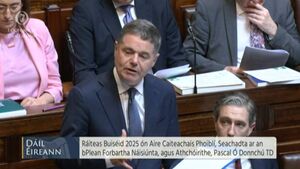Fr Liam Power: Budget 2025 - the ‘Option for the Poor’

Paschal Donohoe delivers Budget 2025. Photo: Oireachtas TV
Budget 2025, presented in the Dáil recently by ministers Jack Chambers and Paschal Donohoe, was, in the view of many, intended to woo voters. Anticipating the announcement of a general election very soon, the government, with an unprecedented budgetary surplus of €25 billion, did not disappoint all who were predicting the “biggest bonanza budget in the history of the state”.
Resources were spread widely to target voters.
Unfortunately, those on higher incomes will benefit the most.
For example, those in the middle-income bracket will have an additional income of over €2,000 because of the increase in the standard rate cut-off of tax. Those on lower incomes will not benefit.
So, I asked myself how, as a Christian, would I evaluate Budget 2025?
Any reflection must be governed by Pope Francis’ powerful admonition that the primary duty of Christians in society is to make a serious option for the poor. This gives a framework, a context or lens with which to analyse the budget.
Such a lens has a solid scriptural basis. There is overwhelming evidence in the bible that God is outraged by social injustice. The great prophets were inspired to challenge oppression and work to establish a just society.
Spirit-inspired prophets like Moses and Amos led their people in resisting oppression. Jesus went further - he ‘emptied’ himself to live as one of the poor.
He condemned the exploitation of the poor that flourished under the Roman Empire; he challenged and rejected the oppressive version of religion that was dominant at that time in his country, one that taught that God did not look with favour on the poor, the sick and those who did not abide with a multitude of petty regulations. He proclaimed the reign of God where the poor are blessed.
Liberation theologians claim that the poor have a special insight into the grace of God at work in their lives. They realise how dependent they are on God’s grace and presence in their lives.
Pope Francis calls us to a deep solidarity with the poor, to be immersed in their lives, so that we can experience at first hand their pain and struggle and thus grow in compassion.
Analysing Budget 2025 from the perspective of the ‘option for the poor’, Social Justice Ireland (SJI) has identified serious flaws. SJI claims that in Ireland, with full employment and a considerable budget surplus thanks to the ‘Apple Tax’ windfall, high rates of poverty still persist. Choices made at a budget time should focus on those with the lowest income and ensure that Ireland provides income adequacy in the social protection system.
Almost 10% of the population is at risk of poverty. Targeted permanent supports for vulnerable groups are what is needed to make a lasting impact.
Government has delivered less than half of what was required in the budget for Ireland’s poorest to have an adequate standard of living.
Whilst there was an increase of €12 in social welfare rates, they fell short of the €25 to address income adequacy among the poorest families, especially in the context of the cost-of-living pressures. Although there were some generous once-off lump-sum payments, they will not help long term.
So “a more appropriate increase would enable households to buy essentials routinely and not as treats.”
Child poverty is another issue that was not seriously tackled in Budget 2025. There were generous allowances for double child benefits for newborns and other one-off payments, but the most vulnerable children are still in a precarious position.
SJI argued persuasively that child benefit must be increased by €50 per month if we want to impact child poverty.
Budget 2024 failed to deliver on housing. Considering that there is a deficit of almost 256,000 homes, housing targets are inadequate according to SJI. Over 50,000 housing units are needed annually to meet the demand.
Whilst Budget 2025 committed to the construction of 10,000 social housing units, this falls considerably short of addressing the ongoing need of at least 115,000 houses.
There is likely to be a considerable shortfall of targets for 2024, given that only 159 houses of a target of 9,300 social homes were built in the first quarter of 2024.
Analysts have also pointed out that housing subsidies, such as the ‘Help to Buy’ scheme, disproportionately support higher-income earners to purchase higher-priced houses.
The Government, obviously with a keen eye on the general election, distributed huge resources in Budget 2025. But according to most analysts, much of the enduring distribution will be upward.
Those on higher incomes will benefit more from taxation changes. This means that the gap between the rich and poor will widen, which will further destabilise our society.
In our parish, it is obvious that the number of people experiencing deprivation because of cost-of-living pressures is rising. I would have to concur with the SJI claim that the decision to allocate resources to the wealthy rather than the poor is unfair.






